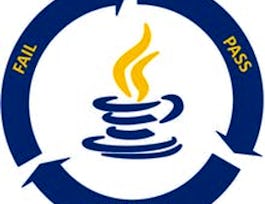This course introduces state-of-the-art techniques for automated analysis. Automated analysis encompasses both approaches to automatically generate a very large number of tests to check whether programs meet requirements, and also means by which it is possible to *prove* that software meets requirements and that it is free from certain commonly-occurring defects, such as divide-by-zero, overflow/underflow, deadlock, race-condition freedom, buffer/array overflow, uncaught exceptions, and several other commonly-occurring bugs that can lead to program failures or security problems. The learner will become familiar with the fundamental theory and applications of such approaches, and apply a variety of automated analysis techniques on example programs.


Introduction to Automated Analysis
This course is part of Software Testing and Automation Specialization
Taught in English
Some content may not be translated


Instructors: Mike
13,592 already enrolled
Included with 
Course
(71 reviews)
Recommended experience
Skills you'll gain
Details to know

Add to your LinkedIn profile
16 quizzes
Course
(71 reviews)
Recommended experience
See how employees at top companies are mastering in-demand skills

Build your subject-matter expertise
- Learn new concepts from industry experts
- Gain a foundational understanding of a subject or tool
- Develop job-relevant skills with hands-on projects
- Earn a shareable career certificate


Earn a career certificate
Add this credential to your LinkedIn profile, resume, or CV
Share it on social media and in your performance review

There are 4 modules in this course
In this module we will learn about a range of techniques for analysis of programs and methods to automate testing. Along the way we will learn how to specify properties of interest to check about a program and capture assumptions about the environment for effective testing. To reinforce some of the important concepts learned we will practice automated testing using effective tools on a concrete example.
What's included
8 videos1 reading5 quizzes1 programming assignment
The focus of this module is to understand how various techniques can help us automate the generation of useful and numerous tests. We will examine ways to specify and use properties of the system and the environment to guide the generation of test data.
What's included
8 videos4 quizzes1 programming assignment
The goal of this module is to introduce the learner to the principles of statically analyzing programs, understand how analysis techniques work by looking at some example analyses, and some good practices to follow when designing programs to enable the tools to help us detect and avoid defects. The learner will gain an understanding of using static analysis tools by looking at one concrete tool.
What's included
5 videos1 reading3 quizzes
This module will examine how to use effective automation techniques for a variety of purposes such as performing effective regression testing, discovering security vulnerabilities and monitoring software at run-time for critical properties.
What's included
6 videos2 readings4 quizzes
Offered by
Recommended if you're interested in Software Development

University of Minnesota

University of Minnesota

LearnQuest
Why people choose Coursera for their career




Learner reviews
Showing 3 of 71
71 reviews
- 5 stars
58.33%
- 4 stars
20.83%
- 3 stars
12.50%
- 2 stars
4.16%
- 1 star
4.16%
New to Software Development? Start here.

Open new doors with Coursera Plus
Unlimited access to 7,000+ world-class courses, hands-on projects, and job-ready certificate programs - all included in your subscription
Advance your career with an online degree
Earn a degree from world-class universities - 100% online
Join over 3,400 global companies that choose Coursera for Business
Upskill your employees to excel in the digital economy
Frequently asked questions
Access to lectures and assignments depends on your type of enrollment. If you take a course in audit mode, you will be able to see most course materials for free. To access graded assignments and to earn a Certificate, you will need to purchase the Certificate experience, during or after your audit. If you don't see the audit option:
The course may not offer an audit option. You can try a Free Trial instead, or apply for Financial Aid.
The course may offer 'Full Course, No Certificate' instead. This option lets you see all course materials, submit required assessments, and get a final grade. This also means that you will not be able to purchase a Certificate experience.
When you enroll in the course, you get access to all of the courses in the Specialization, and you earn a certificate when you complete the work. Your electronic Certificate will be added to your Accomplishments page - from there, you can print your Certificate or add it to your LinkedIn profile. If you only want to read and view the course content, you can audit the course for free.
If you subscribed, you get a 7-day free trial during which you can cancel at no penalty. After that, we don’t give refunds, but you can cancel your subscription at any time. See our full refund policy.


